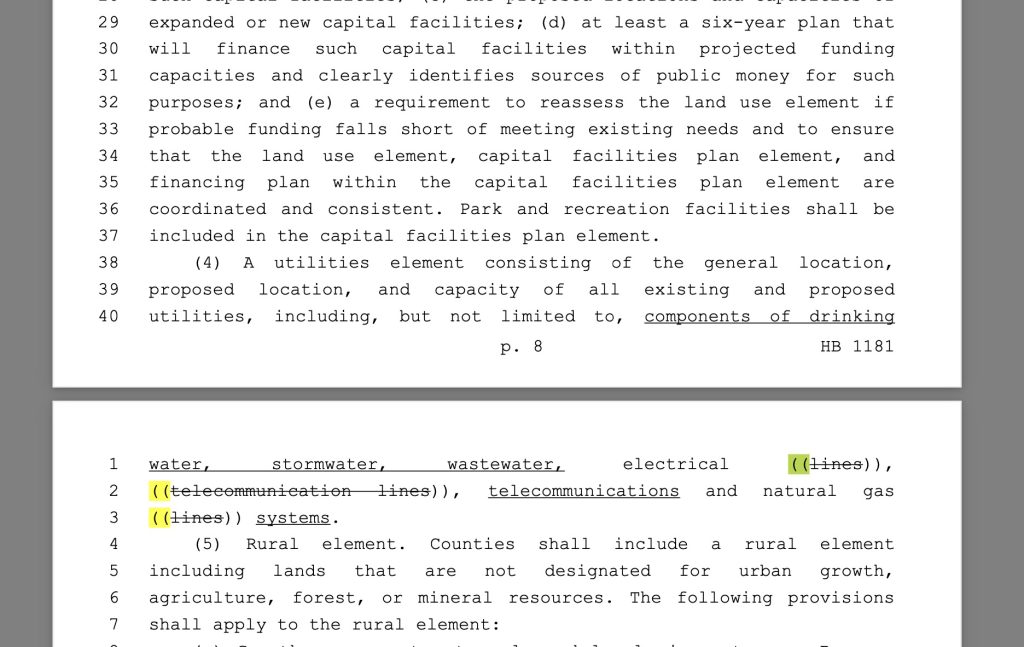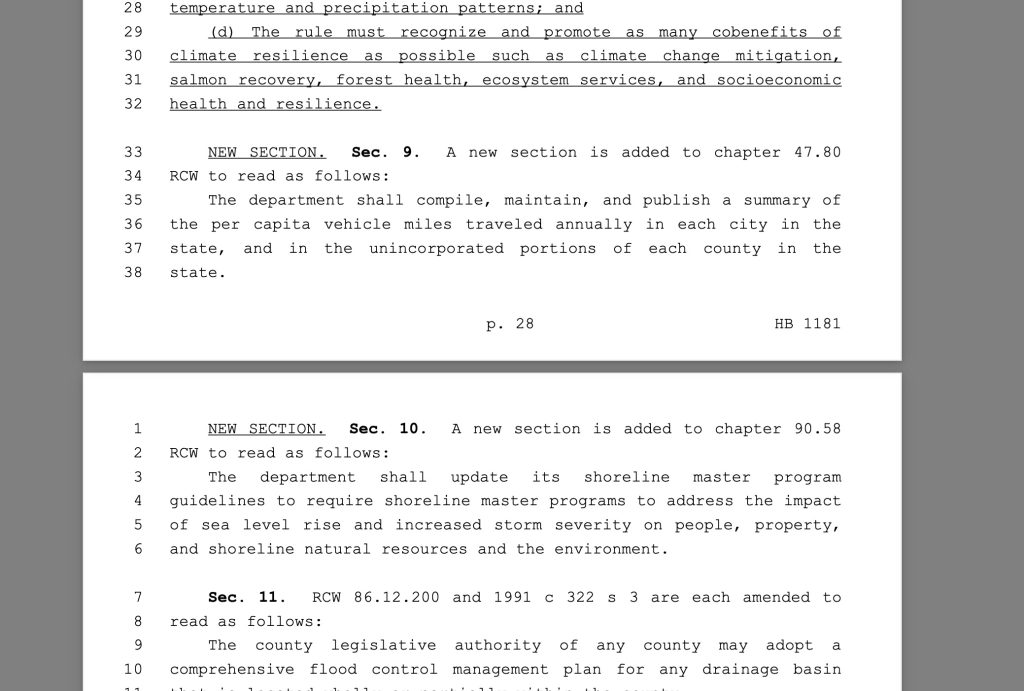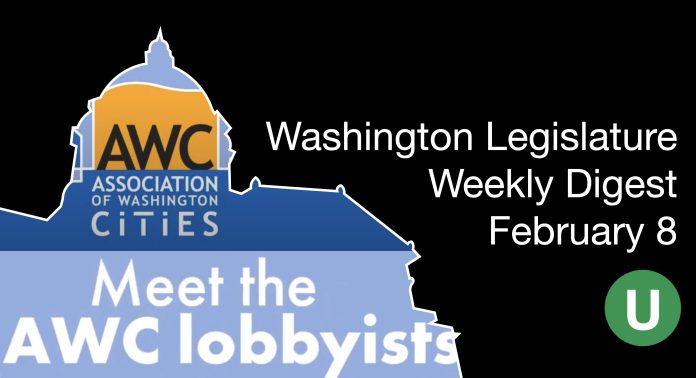In this WALeg report, an introduction to the loud voices yelling for municipal home rule.
- Also in this digest:
- Important Bills at a Glance
- This Week’s Focus: What Is a Substitute Bill?
Who is the Association of Washington Cities?
The Association of Washington Cities (AWC) is a 90-year-old nonprofit that represents Washington’s cities and towns at the state level and receives dues from them as well. Smaller jurisdictions often do little state lobbying outside of the AWC. The group’s representatives are a regular fixture in legislative hearings during the session, and they also mobilize local elected leaders like mayors and city councilmembers to testify.
This year, AWC has identified several priority bills to support in the Washington State Legislature, including HB 1026 to eliminate design review boards for residential development and a number of bills to address questions about drug possession following the Blake decision ruling felony drug possession laws unconstitutional. The group is also supporting favorites like the HB 1131 Wrap Act, HB 1181 to integrate climate change into the GMA, and SB 5514 prohibiting right on red near schools and libraries.
At the same time, AWC tends to be made out as Public Enemy #1 to most progressive change in housing and zoning issues. The rest of their legislative suite gives a glimpse why. AWC leads the charge to gut missing middle housing bills like HB 1110, saying it supports new standards but “asks for amendments consistent with AWC’s housing solutions to focus this proposal on transit, schools, and parks.” The group’s analysis of transit-oriented development bills SB 5466 and HB 1351 are rated amend or oppose respectively, due to “significant restrictions of city authority to regulate parking.”
AWC’s legislative priorities are guided by core principles developed in a Statement of Policy from 2020. The principles are:
- Local decision-making authority
- Fiscal flexibility and sustainability
- Equal standing for cities
- Diversity, equity, and inclusion
- Strong Washington state partnerships
- Nonpartisan analysis and decision-making
That top item is really where the contested space begins. AWC’s guiding view on local decision-making is “we strongly oppose policies and actions that undermine or preempt cities’ authority.” Land use is a core of that self-governance. AWC says they recognize the benefit of state guidance and goals “as long as they are implemented through locally determined processes and regulations and allow for local decision-making.”
The organization’s policy statement on housing makes a similar push: “AWC opposes policies that attempt to address housing challenges through micromanagement of city decision-making.”
Their position on the environment calls for bold leadership and vision, so long as they “do not infringe upon cities’ ability to reflect local priorities and economies.” Home rule and local control are the cornerstones of AWC lobbying efforts.
What local control actually means varies a lot. There are 281 municipalities in Washington State falling into four different categories (and Waitsburg). The 20 largest of them, nine of which are in King County, have a combined 2.8 million people. That’s a third of the population of the state and more than all the other 261 towns and cities put together. Moreover, remote Eastern cities like Chewelah (pop. 2,470) have very different self governance issues than segregated metropolitan enclaves like Medina (pop. 2,915) who benefit from services in nearby cities but shun growth themselves.
While AWC discusses equity issues and seeks “policy opportunities as well as deliberate actions to enhance diversity, equity, and inclusion for all our residents in every community,” it overlooks where cities are themselves exclusion engines and home rule shatters the metropolitan area into a patchwork of locked gates. King County Councilmember Girmay Zahilay has called out such segregation by city line, illustrated by gentrification and displacement in unincorporated Skyway.
At the same time AWC testifies, each of these municipalities also lobby to preserve their own local control. Anyone who has attended a legislative hearing knows that local officials get recognized by legislators and often given deference and a pretty wide latitude in their testimony. It makes news when they don’t.
In the double layered lobbying for local control rests both the irony of AWC and the hope for something better. The hope is that AWC shows the ability for a diverse array of communities to get attention by coordinating their responses to existential threats. The irony is that AWC is deadset on preserving cities’ right not to. Until that exclusive mindset is overcome, expect that local control arguments are a given in every bit of legislation presented in Olympia.
Important bills at a glance
- HB 1110 – Missing Middle
- HB 1181 – GMA Climate Change provisions
- HB 1045 – Evergreen Basic Income pilot
- HB 1026 – Local Government Design Review Reform
- HB 1131 – WRAP Act (bottle deposit and packaging reform)
- HB 1040 – Aviation and Aerospace Advisory Committee
- SB 5466 – Promoting Transit Oriented Development
- SB 5383 – Concerning Pedestrians Crossing and Moving Along Roadways
- HB 1124 – Protecting Tenants from Excessive Rent and Related Fees
- HB 1388 – Protecting Tenants By Prohibiting Predatory Residential Rent Practices
- HB 1389 – Residential Rent Increases Under the Landlord Tenant Act
HB 1110/SB 5190 – Increasing Middle Housing In Areas Traditionally Dedicated to Single Family Detached Housing
- Lead Sponsors: Rep. Jessica Bateman (D – Olympia) and Sen. Yasmin Trudeau (D – Tacoma)
- Link: the House Bill, the Senate Bill
- Description and Notes: Missing middle housing legislation allowing fourplexes everywhere zoned single family and sixplexes near transit
- Current Status – HB1110: Feb. 7 – Executive action taken in the House Committee on Housing
- Current Status – SB5190: Feb. 8 – Scheduled for executive session in the Senate Committee on Housing at 1:30 PM
- Resources: Rep. Bateman has released a Proposed Substitute Bill for HB 1110 making carveouts for small jurisdictions. Check out last week’s WALeg Wednesday pierce the thin arguments against the bills and The Urbanist’s team breakdown of this very important legislation.
HB 1181/ SB 5203 – Improving the State’s Response to Climate Change by Updating the State’s Planning Framework
- Lead Sponsor: Rep. Davina Duerr (D – Bothell) and Sen. Liz Lovelett (D – Anacortes)
- Link: the House Bill, the Senate Bill
- Description and Notes: Reintroduction of last session’s HB 1099, a bill to compel jurisdictions to put climate change provisions in their Comprehensive Plans.
- Current Status – HB1181: Jan 20 – Passed Substitute bill from House Committee on Local Government
- Feb 6 – Public hearing in the House Committee on Appropriations
- Feb 9 – Scheduled for executive session in the House Committee on Appropriations
- Current Status – SB5203: Feb 9 – Scheduled for executive session in the Senate Committee on Local Government, Land Use & Tribal Affairs
- Resources: Please see December’s Meetup with Futurewise and Futurewise’s campaign page.
HB 1045 – Creating the Evergreen Basic Income Pilot Program
- Lead Sponsor: Liz Berry (D – Seattle)
- Link: the House Bill
- Description and Notes: Monthly payment equal to the county’s fair market rent at the time of application for 7,500 pilot recipients. Kicks off July 1, 2024. Eligible: adults with income less than 200% of the federal poverty level with transitions or conditions associated with high economic instability: pregnant, kid under five, homeless, immigrant, refugee, asylee, exiting foster care or justice system, domestic violence, disability, or behavioral health disorder.
- Current Status: Jan. 24 – Substitute bill passed out of Human Services, Youth, & Early Learning with amendments to:
- No change since Jan. 26 – Referred to Appropriations
- Resources: We have a South Park pilot of Guaranteed Basic Income, and Scientific American’s recent look at Universal Basic Income.
HB 1026 – Local Government Design Review Reform
- Lead Sponsor: Amy Walen (D – Kirkland)
- Link: the House Bill
- Description and Notes: Limits design review for housing to administrative design review and drops public meetings by external boards. Has the potential to overcome predatory delays by removing the local power to require public meeting design review for housing.
- Current Status: Jan. 19 – House Committee on Housing, majority recommends passing substitute bill that carves out an exemption, allowing design review for historic districts.
- Jan. 23 – Referred to Rules 2 Review.
- No change since Jan. 24 – Rules Committee relieved of further consideration. Placed on second reading.
- Resources: The Urbanist’s coverage of Seattle’s need to overhaul design review and the first tacit steps.
HB 1131 – Improving Washington’s Solid Waste Outcomes (WRAP Act)
- Lead Sponsor: Berry
- Link: the House Bill
- Description and Notes: Producer responsibility for packaging and paper products, postconsumer recycled content requirements, bottle deposit standards, and amendments to solid waste management.
- Current Status: Feb. 2 – Substitute bill passed executive session in the House Committee on Environment & Energy
- Extends timelines for implementation
- Adds exempt materials
- Lowers performance measures
- Feb. 7 – Referred to Appropriations.
- Resources: Here is the substitute bill. Check out Ashli Blow’s article introducing us to the Washington Recycling and Packaging Act (WRAP Act) and the need for it now.
HB 1040 – Aviation and Aerospace Advisory Committee
- Lead Sponsor: Walen
- Link: the House Bill
- Description and Notes: Aerospace and aviation advisory committee putting together a list of the industry’s strengths and needs for the Secretary of Transportation. Lots of representation on the committee from aerospace and aviation, but only one rep from a “statewide environmental organization.” The committee’s consideration of greenhouse gases is item F after expansions and tech considerations.
- Current Status: No change since Jan. 11 – Scheduled for public hearing in the House Committee on Innovation, Community & Economic Development, & Veterans at 8:00am.
- Resources: A very extensive article from the Journal of Air Transport Managementa bout the outsize impact that aircraft have on greenhouse gases and the possibility of net-zero business models, should that be a higher-than-F level priority.
SB 5466 / HB 1517 – Promoting Transit Oriented Development
- Lead Sponsors: Marko Liias (D – Edmonds) and Rep. Julia Reed (D – Seattle)
- Link: the Senate Bill, the House Bill
- Description and Notes: A bill requested by the Governor’s Office that acts as a complement to HB 1110’s missing middle push. Encourages denser housing near rapid transit.
- Current Status – SB 5466: Jan. 19 – First reading, referred to Local Government, Land Use & Tribal Affairs.
- Jan. 31 – Public hearing in the Senate Committee on Local Government, Land Use & Tribal Affairs.
- Feb. 7 – Original bill passed the Senate Committee on Local Government, Land Use & Tribal Affairs and refer to Transportation.
- Feb. 8 – Referred to Transportation.
- Current Status – HB1517: Jan. 23 – First reading, referred to Housing.
- Feb. 7 – Public hearing in the House Committee on Housing.
- Resources: The Urbanist did a big breakdown of the bill from January and also has done a little coverage of transit-oriented development (TOD) in the past. And some good info on this TOD bill from Sightline Institute.
SB 5383 / HB 1428 – Concerning Pedestrians Crossing and Moving Along Roadways
- Lead Sponsors: Sen. Rebecca Saldaña (D – Seattle) and Rep. Emily Alvarado (D – Seattle)
- Link: the Senate Bill, the House Bill
- Description and Notes: Concise and to the point. “A pedestrian may cross a roadway at any point unless a reasonably careful person would realize there is an immediate danger of a collision with a moving vehicle, a person operating a bicycle, or personal delivery device.” Then it supersedes all local rules to the contrary.
- Current Status – SB5383: No change since Jan. 16 – First reading, referred to Transportation.
- Current Status – HB1428: Jan. 18 – First reading, referred to Transportation.
- Feb. 8 – Scheduled for public hearing in the House Committee on Transportation.
- Resources: See WALeg Week 2 – Weekly Focus with the troubling origins of “jaywalking” and the ways removing these laws makes the streets safer.
HB 1124 – Protecting Tenants from Excessive Rent and Related Fees
- Lead Sponsor: Strom Peterson (D – Lynnwood)
- Link: the House Bill
- Description and Notes: A landlord may not increase the rent paid by a tenant in an amount greater than 5% above the base rent without providing written notice between 180 and 220 days before the increase takes effect. First month and security deposit fees may not exceed one month’s rent. Brings the state in line with Seattle’s 180 day notice requirement.
- Current Status: Jan. 26 – Substitute bill passed out of committee with amendments to clarify when rent includes utilities.
- No change since Jan. 30 – Referred to Rules 2 Review
- Resources: See WALeg Week 3 – Weekly Focus with the difference between rent stabilization bills like these and the misnomer “rent control” that gets dropped pejoratively against any sort of benefit for renters.
HB 1388 – Protecting Tenants by Prohibiting Predatory Residential Rent Practices
- Lead Sponsor: Nicole Macri (D – Seattle)
- Link: the House Bill
- Description and Notes: A landlord or trailer park property owner may not:
- Increase to an excessive rent
- Charge more burdensome rent or fees between month-to-month or longer
- Charge move in fees or security deposits more than one months rent.
- Gives the State AG power to enforce with civil penalties. Excessive rent is defined as the greater of 3% or inflation up to 7%.
- Current Status: Jan. 11 – Scheduled for public hearing in the House Committee on Innovation, Community & Economic Development, & Veterans at 8:00am.
- Feb. 9 – Scheduled for executive session in the House Committee on Housing at 8:00 AM (Subject to change)
- Resources: See WALeg Week 3 – Weekly Focus with the difference between rent stabilization bills like these and the misnomer “rent control” that gets dropped pejoratively against any sort of benefit for renters.
HB 1389/SB 5435 – Residential Rent Increases Under the Landlord Tenant Act
- Lead Sponsors: Alex Ramel (D – Camano Island), Trudeau
- Link: the House Bill
- Description and Notes: Landlord may not increase rent more than the rate of inflation as measured by the consumer price index or 3%, whichever is greater, up to a maximum of 7% above the existing rent. Exceptions for less than 10-year-old buildings, public housing, improvements beyond maintenance, and a hardship exemption. Also creates a “banked capacity program” where, with notice, the landlord can skip increases and store up to 3% per year.
- Current Status HB1389: Jan. 17 – First reading, referred to Housing.
- No change since Jan. 24 – Public hearing in the House Committee on Housing at 4:00pm
- Current Status SB5435: Jan 18 – First reading, referred to Housing.
- Jan. 27 – Public hearing in the Senate Committee on Housing at 10:30 AM.
- Feb. 10 – Scheduled for executive session in the Senate Committee on Housing at 10:30 AM (Subject to change).
- Resources: See WALeg Week 3 – Weekly Focus with the difference between rent stabilization bills like these and the misnomer “rent control” that gets dropped pejoratively against any sort of benefit for renters.
This Week’s Focus: What Is a Substitute Bill?
As we move ahead in the legislative session, we are seeing more bills leaving committees, and thus more Substitute Bills. Simply put a substitute bill is a complete rewrite of the bill. That is not always a bad thing.
In the formatting of bills, there are several conventions. The standard is that text from the Revised Code of Washington (RCW) is marked with an underline to be added and a ((double parenthesis strikethrough)) to be deleted. Easy enough. There is also the convention that, if a bill adds an entire new section to the law, it is called a NEW SECTION the beginning of the section, and left to regular text afterwards.

As a bill is amended on its move through the chambers, more and more sections are added and removed with notations marking them as amendments. These in turn can be further confused for partial deletions of subsequent amendments, and this is the point where we just thank goodness the underappreciated and underpaid legislative staff in Olympia who keep this whole thing moving.
So the committee in the house of origin may create a substitute bill that simply cleans up the whole mess. So far, that is what appears to be happening with many of the bills we are tracking. Committee staff will include a list of differences between the original and substitute bills, like this one for HB 1131 the WRAP Act, which are exhaustive and can get kind of lengthy.
There are times when a substitute bill does gut the original bill or significantly alter it. The Urbanist tries to call attention to such legislative shenanigans, such as what happened with last year’s missing middle housing bill. Let’s hope that will not be necessary this year.

Ray Dubicki is a stay-at-home dad and parent-on-call for taking care of general school and neighborhood tasks around Ballard. This lets him see how urbanism works (or doesn’t) during the hours most people are locked in their office. He is an attorney and urbanist by training, with soup-to-nuts planning experience from code enforcement to university development to writing zoning ordinances. He enjoys using PowerPoint, but only because it’s no longer a weekly obligation.



